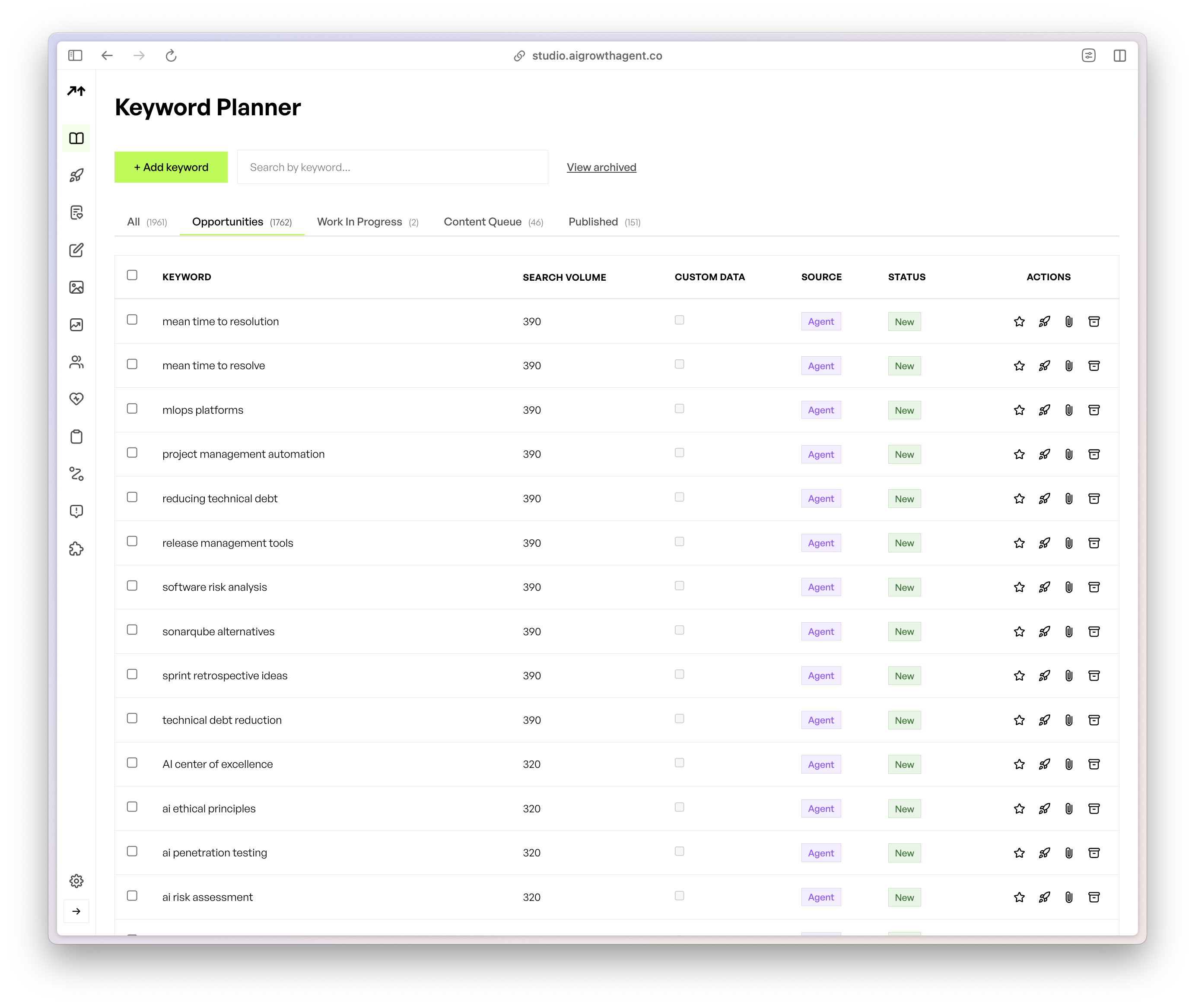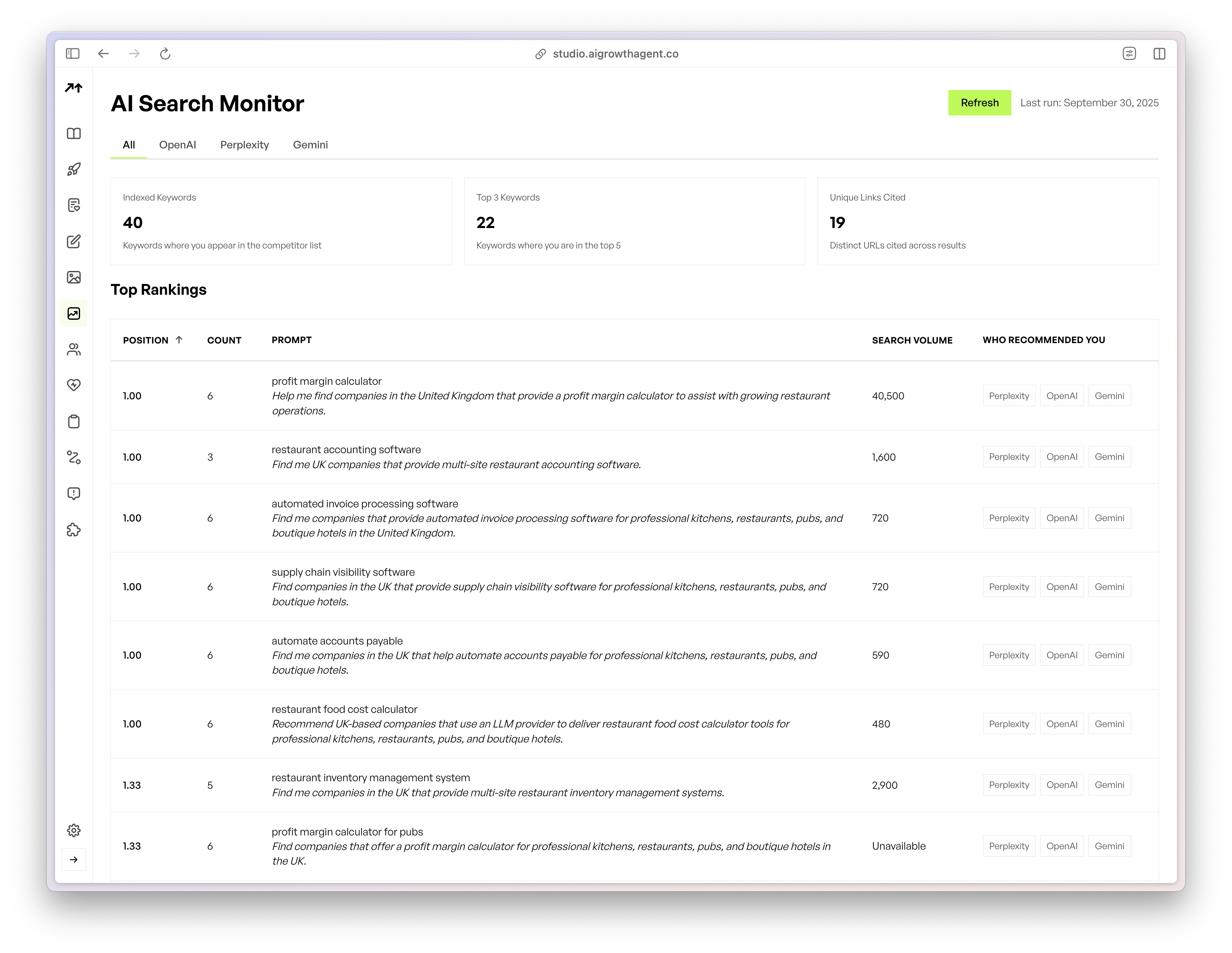Key Takeaways
- AI search systems like ChatGPT, Google AI Overviews, and Perplexity now shape many stages of B2B buying, so enterprise marketing teams need content built for AI discovery, not only traditional search.
- Programmatic SEO and AI-readable technical structures matter more than isolated articles, because AI agents rely on structured, high-volume, and consistently maintained content to select citations.
- General AI writing tools, SEO platforms, and traditional agencies each cover parts of the workflow, but they rarely provide true end-to-end automation for research, writing, technical SEO, and publishing at enterprise scale.
- Autonomous systems that blend content strategy, technical SEO, and publishing workflows give multi-brand organizations a practical way to keep pace with AI search across many products and markets.
- Marketing leaders who want an autonomous, programmatic SEO approach to AI search can explore AI Growth Agent by scheduling a demo with the AI Growth Agent team.
The AI Search Revolution: Why Enterprise Marketers Need a New Approach
Enterprise marketers now compete in an environment where AI agents shape discovery and recommendation. AI agents already influence many steps in modern marketing and buying journeys, which reduces the impact of tactics built only for classic search results pages.
Brand visibility keeps shrinking as AI multiplies the amount of content online. Modern AI content optimization depends on continuous processes that close gaps, improve structure, and meet AI-readability standards. This level of consistency often exceeds what manual teams or basic tools can maintain.
AI systems need dense, structured signals to treat a company as an authority. When those signals are missing, recommendation engines turn to better-documented competitors. Monthly publishing of a few handcrafted posts rarely keeps pace with the volume and technical standards needed for 2026 AI search.
Enterprise teams that want to build durable AI visibility can explore an autonomous approach by booking a consultation with AI Growth Agent.
Essential Criteria for Enterprise AI Content Solutions in 2026
Enterprise buyers need clear criteria before selecting an AI content solution. Effective platforms typically provide:
- Programmatic SEO capabilities: large-scale content generation with built-in technical SEO, not only copywriting.
- AI search optimization and citation potential: support for structures like LLM.txt, Model Context Protocol, and AI-readable formatting.
- Scalability and multi-brand management: capacity to run many initiatives in parallel across regions, brands, or portfolios.
- Integration and technical infrastructure: reliable connections to CMS platforms, automation tools, and schema frameworks.
- Authority and quality control: fact-checking, brand voice consistency, and feedback loops that refine outputs over time.
- Autonomy and efficiency: practical set-and-monitor workflows that reduce operational load on internal teams.
These criteria help teams distinguish between tactical writing aids and systems that create a sustained competitive position in AI search.
Comparing Top AI Content Solutions for Enterprise Marketing
Enterprise AI content tools fall into several functional groups. Most offerings cluster into general writing assistants, SEO optimization platforms, integrated marketing suites, and automation tools. Capabilities for programmatic SEO and AI search vary widely across these categories.
General AI Writing Tools (ChatGPT, Jasper, Copy.ai)
General AI writing assistants focus on drafting text, outlining ideas, and supporting individual creators. Many include templates for blog posts, emails, and ads, with light SEO guidance.
Key advantages include rapid content drafting, accessible pricing, and broad topic coverage. Teams can use them to accelerate ideation and first drafts without heavy setup.
Main limitations for enterprise use involve scale and integration. Most tools do not natively handle full programmatic SEO, advanced AI-readability structures, or automated publishing across complex content architectures. Internal teams must still manage research, technical SEO, and coordination work.
AI Growth Agent differs by operating as an autonomous programmatic SEO agent rather than a writing companion. The system plans architectures, conducts research, writes, and applies technical SEO with direct support for structures such as LLM.txt and Model Context Protocol, which improves AI citation potential.
SEO Content Optimization Platforms (Clearscope, MarketMuse, Surfer SEO)
SEO optimization platforms specialize in topic modeling, content scoring, and SERP-based recommendations. Platforms such as Clearscope and MarketMuse provide deep keyword research, gap analysis, and competitive insights for editorial teams.
These tools help teams decide what to write, how to structure pages, and which topics to emphasize. They can guide programmatic SEO planning and prioritize themes that align with demand.
Most platforms, however, stop at diagnosis. Enterprise teams still need to create content manually, implement technical recommendations, and manage continuous updates. This introduces delays and headcount constraints.
AI Growth Agent fills that execution gap by turning research and opportunity areas into automatically produced, technically optimized content. The platform moves from analysis to hands-off delivery across research, drafting, on-page SEO, and publishing.
Traditional Content Marketing and SEO Agencies
Agencies provide human-led strategy, copywriting, and SEO support. They often deliver tailored content and one-on-one guidance from specialists.
This model works well for complex narratives and high-touch campaigns, but production speed and volume remain limited by headcount. Many agencies still publish only a handful of articles each month for a given client, which restricts programmatic SEO potential and AI search coverage.
AI Growth Agent functions as a content technology layer rather than a services shop. The system focuses on engineered authority at scale, allowing brands to produce and maintain a much larger content footprint while preserving quality and alignment.
AI Growth Agent: Autonomous Programmatic SEO for AI Search
AI Growth Agent introduces a category built specifically for AI search: the autonomous Programmatic SEO Agent. The platform is designed for enterprise teams that need reliable coverage across many keywords, segments, or brands.
Core capabilities include multi-tenant programmatic deployment for complex organizations, real-time programmatic content injection for fast-moving topics, database-to-content automation that turns proprietary data into pages, and intelligent image and asset placement with optimized metadata.
The system resolves the usual tension between scale and quality. AI Growth Agent engineers and publishes high-quality content at a pace that manual teams cannot match, while embedding advanced technical SEO structures such as LLM.txt and blog-specific Model Context Protocol so AI agents can recognize and cite the content more effectively.
Teams that want to evaluate this approach can schedule a demo with AI Growth Agent to review programmatic SEO use cases.

Comparative Table: AI Content Solutions for Enterprise Marketing Leaders
|
Feature/Criterion |
Basic AI Tools |
SEO Platforms |
Traditional Agencies |
AI Growth Agent |
|
Programmatic SEO scale |
Limited |
Planning only |
Manual and slow |
Autonomous at high volume |
|
AI citation potential |
Basic |
Analysis only |
Inconsistent |
Advanced (LLM.txt and MCP) |
|
Technical SEO automation |
None |
Recommendations |
Manual implementation |
Full automation |
|
Enterprise scalability |
Individual use |
Team planning |
Resource constrained |
Multi-tenant ready |
Real-World Impact: Building AI Search Authority with AI Growth Agent
Programmatic SEO tuned for AI search already delivers measurable gains for organizations across different industries and audience sizes.
- Exceeds AI (performance reviews): earned Perplexity recommendations and Google AI Overview visibility within weeks, along with citations across leading AI search engines for engineering performance review queries.
- BeConfident (English learning): gained rapid indexing and strong AI-search recommendations in Brazil, competing with larger language-learning apps.
- Bucked Up (sports nutrition): reached AI citations as a recognized protein soda brand within weeks, appearing alongside established competitors.
- Gitar (AI-powered CI/CD): built reference-brand status for AI CI/CD automation in under two months, becoming a frequent citation across AI search tools for queries about fixing CI builds and self-healing software.

Choosing the Best AI Content Solution for Your Enterprise
Enterprise marketers now move from isolated tools toward integrated AI systems. Current trends show adoption of AI as end-to-end orchestration, not just productivity utilities, which raises the bar for platform selection.
Teams seeking modest workflow gains often combine SEO platforms with writing assistants. These stacks can improve content output but still depend on manual coordination.
Brands that aim to become the most cited and recommended sources in AI search usually need more automation. Autonomous programmatic solutions help close gaps in velocity, consistency, and technical depth, especially for multi-brand or multi-product companies.
Practical decision factors include current content velocity versus competitive benchmarks, internal technical resources, portfolio complexity, and appetite for AI search leadership. Integration with existing tools and predictable SaaS pricing, as seen across many enterprise AI marketing platforms, remain critical.
Leaders who want to evaluate autonomous programmatic SEO can book an AI Growth Agent demo and review fit based on their roadmap.
Frequently Asked Questions (FAQ) about AI Content Solutions
How does AI Growth Agent differ from general AI writing tools like ChatGPT for enterprise needs?
General AI tools focus on generating text in response to prompts. AI Growth Agent instead runs as an autonomous Programmatic SEO Agent that plans architectures, conducts research, drafts content, applies technical SEO, and publishes from a single system. The platform includes support for LLM.txt and Model Context Protocol, which improves how AI search engines index and cite enterprise content.
Can AI Growth Agent integrate with our existing CMS and marketing stack?
AI Growth Agent connects with major CMS platforms such as WordPress, Hashnode, Webflow, Framer, Sanity, and HubSpot. Many clients also choose the hosted option, which provides a technically optimized environment for programmatic SEO, including schema, metadata, and AI-readability features without internal engineering work.
What is AI citation and why is it critical for enterprise marketers in 2026?
AI citation occurs when systems such as ChatGPT, Gemini, and Perplexity reference or recommend a company’s content within their responses. In 2026, these citations guide how prospects discover vendors, compare options, and build trust, so brands that earn consistent AI citations hold a stronger position in digital buying journeys.
Is AI Growth Agent suitable for multi-brand enterprises or companies with many product lines?
AI Growth Agent supports multi-tenant programmatic deployment. Enterprises can run multiple Programmatic SEO Content Agents from one interface, each with its own manifesto, brand voice, and keyword strategy, publishing to specific domains or subdomains. This suits private equity portfolios, venture-backed groups, and enterprises with many lines of business.
How quickly can AI Growth Agent start producing results for AI search optimization?
Typical onboarding moves from initial meeting to the first programmatically engineered article within about one week. The process starts with a kickoff session to define the company manifesto and agent configuration, followed by automated research and content generation. Many clients see AI indexing within days, with citation gains often emerging within several weeks.
Conclusion: Establish Durable Authority in the AI Search Era
AI-powered search reshapes how authority forms and spreads online. Enterprise marketers now need solutions that combine content strategy, technical SEO, and automation so AI agents can recognize and recommend their brands.
Organizations that adopt autonomous programmatic SEO gain a structural advantage. Their content appears more often as the source AI systems reference when answering complex queries, which compounds over time into category authority.
Marketing leaders who want to build this kind of presence can schedule a consultation with AI Growth Agent and evaluate how an autonomous Programmatic SEO Agent fits into their 2026 growth strategy.